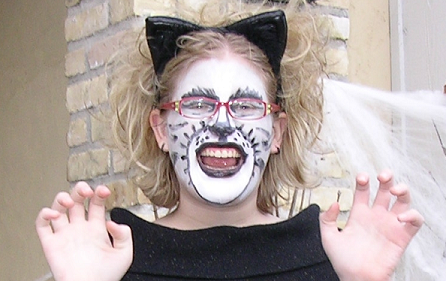When I Realized How Acting Could Help Me as a Person on the Autism Spectrum
I don’t know exactly when I figured it out. But I know it took too long. You see, I’ve
been taking acting classes since I was a kid. My mom’s a big theater fan, while my father acted a lot in college, so it only seemed natural that I gave it a try. And unlike sports and musical instruments, acting stuck.
I really enjoyed it. It was like playing make believe, which was a favorite game of my friends and me, but other people got to enjoy it, too. Now, I never intended to be a professional actress (which is not as impossible a dream as it might seem in the Twin Cities), but I still took the classes. And when it came time for high school, I branched out from Catholic school and went to a performing arts school instead as a theatre major. It was definitely a big change, but it was the best decision I’ve ever made. I finally felt like I fit in, in the sense that I was now with a bunch of other people who really didn’t fit in either.
People were more accepting and, for once, it didn’t feel like everyone was trying to change me.
It was in high school when I was first diagnosed with Asperger’s. It had a few other diagnoses that proceeded this, but Asperger’s was the last piece of the puzzle that made everything fit. And, in a turn that may surprise some but not others, a lot of my classmates shared my diagnosis. A lot. So my school was incredibly helpful and accepting, and it felt like everyone (or most people) worked together to help me through school. Without their help, there’s no doubt I wouldn’t have graduated. But getting a little creative with schedules and a bit more lenient with attendance did wonders. I really enjoyed the time I spent there, especially the acting classes.
So, when it came time for college, it seemed natural that I take more acting classes. Even though I said I’m not looking to be a professional actress, I feel like I’m a pretty good one. I’ve never really acted outside classes, but I still felt like I nailed the classes I took. My favorite part was developing my characters. I loved coming up with backstories; I loved making up every little part of their lives. I’d know their childhood, I’d know them inside and out. I’d know how they would react to every little situation, and I would carefully adapt my mannerisms to match theirs.
And I think it was in college when it hit me. I was in a class, working on some improv,
and I looked at my partner and thought, “Oh, their expression shows they’re smiling… but they’re clearly upset. I need to acknowledge that.” But it wasn’t until later that it clicked. I had always thought of acting as a fun game, but once class was over, it was over. But here I was, in the middle of this game, playing it and putting together the pieces. I was picking up on those subtle body cues I’d had so much trouble with in “real” life. I also remembered those times I’d be looking in the mirror, practicing expressions. Trying to figure out how to convey grief, anger, frustration, whatever, without saying a word. Yet I often lacked those expressions in real life. I’d often get confused, and my expression wouldn’t match how I really felt.
When I realized this, I realized I could put all those acting lessons to use. Not only could I recognize other people’s expressions better, but I could also more properly match my own feelings to my body language. This may sound strange to someone who isn’t on the spectrum. But for me, and a lot of others on the spectrum, it’s difficult to properly show emotions. It’s not that I don’t feel them; it’s just that my body doesn’t immediately show them in a way society says it should. I may look entirely blank when I’m grieving, for
instance. But when I realized I could show fake grief in acting class, I realized I could show my real grief in real life.
So from then on, I paid a bit more attention to my expressions and body language. I paid more attention to the subtle changes in my voice, and how to express myself that way. I’d pay a bit more attention to how I felt and how my body must’ve looked. Slowly but surely, I feel like I got better at conveying my emotions in a way that allowed other people to see how I felt, something I always had trouble expressing before.
I know there were other factors at play, too. But I think acting was one of the biggest ways I learned to express myself. It’s incredibly ironic, when you think about it, but in the end playing all those characters helped me learn more about myself. Pretending to be someone I wasn’t made me realize who I was. When I was younger, I’d sometimes feel like I was wasting time with acting classes, since I would never be a real actress. But now I realize that they were some of the most important classes I’ve ever taken.

The Mighty is asking the following: What’s one thing people might not know about your experience with disability, disease or mental illness, and what would you say to teach them? If you’d like to participate, please send a blog post to community@themighty.com. Please include a photo for the piece, a photo of yourself and 1-2 sentence bio. Check out our Submit a Story page for more about our submission guidelines.
